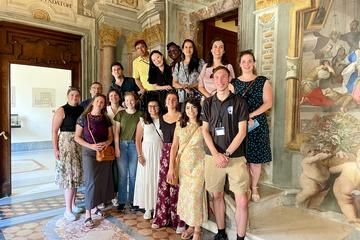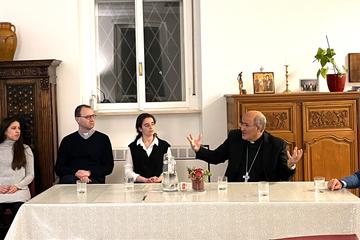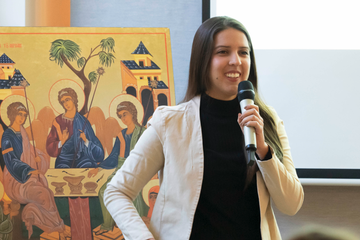In an opportunity to present the work of community members to an external audience, The Lay Centre held an “Open Day on Synodality” Nov. 12. The morning was rich in intellectual dialogue, held among Lay Centre residents and friends. Four scholars gave talks on topics directly or indirectly linked to the theme of synodality. The session was moderated by Loredana Fabijanic, an Angelicum doctoral student from Croatia.
A Romanian Orthodox student of Jewish-Christian dialogue at the Pontifical Gregorian University, Adrian Teodor Oancea, explored the roots of synodality in his tradition. He recalled the etymology of the term “synodality,” which combines the Greek words for “way” or “journey” (hodos) and “together” (syn).
Within the Orthodox Church, Oacea explained, synodality refers to the process of collegial collaboration and discernment in decision making, particularly among bishops sitting in council, but also involving, to certain extent, priests and lay people.
- Maria Teresa Ávila: Lived synodality and the concept of ‘bridge-people’
- Aljaž Krajnc: ‘Religious diversity is willed by God,’ a reflection on human fraternity
- Bruno Hermes: The Gospel groups of Amazonia’s Acre River
- Clemency Flitter: Synodality and inclusion in the Church of England
- WATCH ALL ‘DIES ACADEMICUS’ LECTURES ON OUR YOUTUBE PAGE
That exercise of collective discernment, he said, is more than the mere sum of the many parts that compose the Orthodox communion. In the words of the late Metropolitan Kallistos Ware, the aim of a synod is to “attain a common mind,” reflecting “the presence of Christ Himself, active among” the participants “through the grace of the Holy Spirit.”
It is the attainment of that truly “common mind” that gives synodal decision making its dynamic character, Oacea noted.
He explained that the Orthodox Church comprises 15 autocephalous churches (list here), each with its own synod of bishops, who meet two to three times a year to make decisions about Orthodox life and practice.
At first blush, the practice of synodality at the local level appears limited; only bishops – not lay people, and not even priests – participate in synod assemblies. However, Oacea said, on a more local level, the laity have important roles for the synodal path.
In the Orthodox Church of Romania, for example, lay people and parish priests are elected to serve on diocesan councils for four-year terms, and each diocese elects two lay people and one parish priest to take part in the National Assembly of the Orthodox Church of Romania. Lay participation in church decision making, he said, is “not symbolic or a mere formality, but a functioning fact.”
Local and universal
Oacea also described what he termed a “tension” between the local and the universal in the Orthodox Church: How can unity be guaranteed when each autocephalous church has its own synod? He recognized that the Orthodox Church struggles to find the right balance between unity and autocephaly, or local ecclesial authority, more even so in today’s globalised context.
Among local churches, unity is expressed in shared tradition, dogma, canonical regulations, liturgy, and reception of the Eucharist. It also takes shape in synodal leadership exercised by all bishops, in communion with the Ecumenical Patriarch of Constantinople – a primus inter pares, or the “first among equals.”
Oacea also analysed the expectations and accomplishments of the pan-Orthodox council that was held in Crete in the summer of 2016. Unfortunately, he said, only 10 of the 15 autocephalous churches attended – the Russians’ decision not to attend the assembly was particularly disappointing. All the same, he believes that council was not a failure.
It brought much of the Orthodox world together, he noted, pushing against the temptation to fragmentation, isolation and division. It also provided an opportunity to deepen the church’s understanding of the interplay between synodality and unity.
Reflecting on the remarks of Ecumenical Patriarch Bartholomew at the council, Oacea said that “synodality is intimately linked to the nature of the church and assures its unity,” preventing catholicity from dissolving into the pursuit of mere individual or national interests. The 2016 council, Oacea echoed, “initiated a new era of synodality in the Orthodox Church at the universal level, [in] an epoch of globalisation.”
Additionally, Oacea mentioned that some of the Orthodox churches have proposed convening another pan-Orthodox synod to resolve the dispute involving the Ecumenical Patriarchate and the Moscow Patriarchate over Constantinople’s 2019 decision to grant autocephaly to the Orthodox Church of Ukraine, allowing it to govern itself apart from the Moscow Patriarchate. To date, however, the dispute is ongoing.
Contributed:
Filip Veber
Joseph Tulloch


